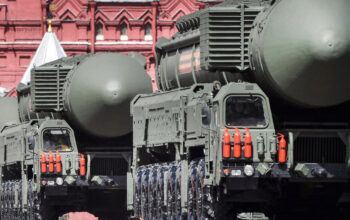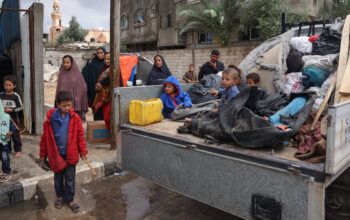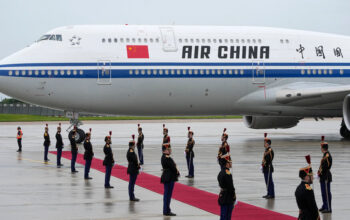
RAMSTEIN AIR BASE, Germany — The United States marshaled 40 allies on Tuesday to furnish Ukraine with long-term military aid in what could become a protracted battle against the Russian invasion, and Germany said it would send dozens of armored antiaircraft vehicles. It was a major policy shift for a country that had wavered over fear of provoking Russia.
The announcement by Germany, Europe’s biggest economy and one of Russia’s most important Western trading partners, was among many signals on Tuesday pointing to further escalation in the war and disappointment for diplomacy.
Germany’s shift on weapons also was seen as a strong affirmation of a toughened message by the Biden administration, which has said it wants to see Russia not only defeated in Ukraine but seriously weakened from the conflict that President Vladimir V. Putin began two months ago.
The increasing flow of Western weapons into Ukraine — including howitzers, armed drones, tanks and ammunition — also amounted to another sign that a war Mr. Putin had expected would divide his Western adversaries had instead drawn them much closer together.
“Putin never imagined that the world would rally behind Ukraine so swiftly and surely,” the American defense secretary, Lloyd J. Austin III, said on Tuesday to uniformed and civilian officials at the U.S. air base in Ramstein, Germany, where he convened defense officials from 40 allied countries.
“Nobody is fooled” by Mr. Putin’s “phony claims on Donbas,” Mr. Austin said, referring to the eastern region of Ukraine, where Russia recently refocused its assaults. “Russia’s invasion is indefensible and so are Russian atrocities,” he said.
Russia’s foreign minister, Sergey V. Lavrov, said on Tuesday that the influx of heavy weapons from Western countries was effectively pushing Ukraine to sabotage peace talks with Moscow, which have shown no concrete signs of progress.
“They will continue that line by filling Ukraine with weapons,” Mr. Lavrov said after meeting in Moscow with the United Nations secretary general, António Guterres, who was undertaking his most active effort yet at diplomacy to halt the war. “If that continues, negotiations won’t yield any result.”
On Monday, Mr. Lavrov resurrected the specter of nuclear war, as Mr. Putin has done at least twice before. Mr. Lavrov said that while such a possibility would be “unacceptable” to Russia, the risks had increased because NATO had “engaged in a war with Russia through a proxy and arming that proxy.”
“The risks are quite considerable,” he said in an interview with Channel One, Russia’s state-run TV network.
“I don’t want them to be blown out of proportion,” he said. But “the danger is serious, real — it must not be underestimated.”
Ukraine’s foreign minister, Dmytro Kuleba, called Mr. Lavrov’s remarks a sign that “Moscow senses defeat in Ukraine.” John F. Kirby, the Pentagon spokesman, called them “obviously unhelpful, not constructive.”
“A nuclear war cannot be won and it shouldn’t be fought,” he said. “There’s no reason for the current conflict in Ukraine to get to that level at all.”
Mr. Austin said the defense officials who had gathered at Ramstein Air Base — from Australia, Belgium, Britain, Italy, Israel and other countries — had agreed to form what he called the Ukraine Contact Group and to meet monthly to ensure they “strengthen Ukraine’s military for the long haul.”
“We are going to keep moving heaven and earth,” to bolster the Ukrainian military, Mr. Austin said.
Germany’s defense minister, Christine Lambrecht, announced at the meeting that Berlin would send Ukraine up to 50 armed vehicles, called Flakpanzer Gepard, designed to shoot down aircraft but also fire at targets on the ground.
Although no longer used by Germany, they have been acquired by Jordan, Qatar, Romania and Brazil, where they have been deployed to defend soccer stadiums from potential drone attacks during international tournaments, according to the manufacturer, Krauss-Maffei Wegmann.
The German government had previously cited a range of reasons to avoid shipping such heavy arms to Ukraine, including that none were readily available, that training Ukrainian soldiers to operate them was time-consuming, and that Russia could be provoked into a wider conflict.
But German officials changed course under growing pressure from the conservative opposition in Berlin, and from members of the governing coalition. Germany has also supplied Ukraine with shoulder-launched antitank rockets and surface-to-air defensive missiles, some from old East German stockpiles.
Secretary of State Antony J. Blinken, who traveled with Mr. Austin to Ukraine this past weekend, affirmed on Tuesday that the United States would support the Ukrainian military in pushing Russian forces out of eastern Ukraine if that is what President Volodymyr Zelensky aims to do.
“If that is how they define their objectives as a sovereign, democratic, independent country, that’s what we’ll support,” Mr. Blinken said at a hearing of the Senate Foreign Relations Committee.
After meeting with Mr. Putin in the Kremlin, Mr. Guterres said he had secured an agreement “in principle” to allow the United Nations and the Red Cross to evacuate civilians from a sprawling steel plant besieged by Russia in the southern Ukrainian port of Mariupol, where they have been holed up for days with Ukrainian fighters. But there was no evidence that the meeting had produced any advances in diplomacy to end the war.
Before the meeting, Mr. Putin asserted that Mr. Guterres had been “misled” about the situation in Mariupol, and he insisted that Russia had been operating workable humanitarian corridors out of the city — an assertion denied by Ukrainian officials, who say their attempts to ferry civilians out of the city have collapsed in the face of threats by Russian forces.
Russia-Ukraine War: Key Developments
Mr. Putin told Mr. Guterres that peace talks with Ukraine were continuing via a video link and that he hoped they would bring “some positive result.” But Mr. Putin said Russia would not sign a security guarantee agreement with Ukraine without a resolution to the territorial questions in Crimea, which Russia annexed in 2014, and in Donbas, where Russia has recognized two separatist regions as independent.
In an escalation of the East-West economic conflict from the war, Poland’s state-owned gas company said on Tuesday that Russia’s state gas company had announced the “complete suspension” of natural gas deliveries to Poland through a major pipeline.
Poland, a NATO member and key conduit for Western arms into Ukraine, gets more than 45 percent of its natural gas from Russia, and cutting off that supply could impair its ability to heat homes and run businesses.
In addition to spreading suffering and death across Ukraine, the invasion has set off the largest exodus of European refugees since World War II.
More than five million people, 90 percent of them women and children, have already left Ukraine since Russia invaded on Feb. 24, according to the United Nations. A further 7.7 million have been driven from their homes by the conflict, but remain in the country.
On Tuesday, the United Nations projected that the number of refugees could rise to 8.3 million by year’s end, and it asked donors for an additional $1.25 billion to finance soaring humanitarian needs in Ukraine.
In another worrisome sign of possible spillover from the war, explosions rattled Transnistria, a small Moscow-backed breakaway republic in Ukraine’s southwest neighbor, Moldova, for the second consecutive day.
It remained unclear who was behind the explosions. The authorities in Transnistria blamed Ukraine, while Ukraine accused Russia of having orchestrated the blasts.
Moldova’s president, Maia Sandu, told reporters that there were “tensions between different forces within the regions, interested in destabilizing the situation.”
At least 12,000 Russian troops are stationed in Transnistria, just 25 miles from Ukraine’s major port, Odesa. Western officials have expressed concerns that Mr. Putin might create a pretext to order more troops into the territory, just as he did before Russian forces moved into Crimea and Donbas.
John Ismay reported from Ramstein Air Base, Christopher F. Schuetze from Berlin and Michael Levenson from New York. Reporting was contributed by Ivan Nechepurenko from Tblisi, Georgia, Michael Schwirtz from Orikhiv, Ukraine, Nick Cumming-Bruce from Geneva, Michael Crowley and Edward Wong from Washington, Matthew Mpoke Bigg from London and Cora Engelbrecht from Krakow, Poland.



